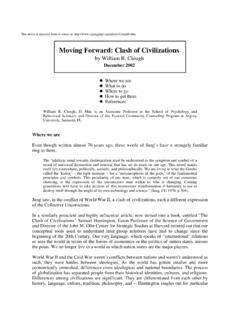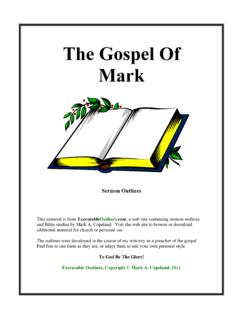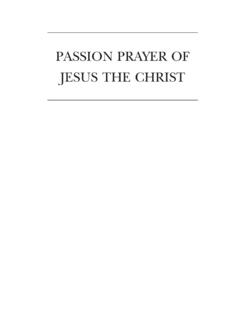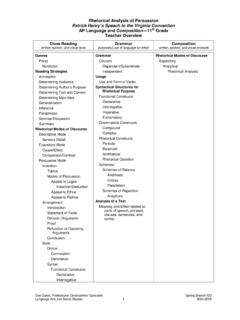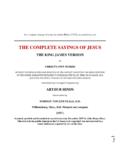Transcription of Beyond Vietnam, speech by Dr. Martin Luther King, NYC, 4/4/67
1 Excerpts: A nation that continues year after year to spend more money on military defensethan on programs of social uplift is approaching spiritual death. War is not the answer. Communism will never be defeated by the use of atomicbombs or nuclear weapons. Let us not join those who shout war and, throughtheir misguided passions, urge the United States to relinquish its participation inthe United Nations. We can no longer afford to worship the god of hate or bow before the altar ofretaliation. The oceans of history are made turbulent by the ever-rising tides ofhate. History is cluttered with the wreckage of nations and individuals thatpursued this self-defeating path of hate.
2 The following is mirrored from its [PDF] source at: A Call to Conscience: The Landmark Speeches of Dr. Martin Luther King, Jr. The Estate of Martin Luther King, Jr. " Beyond Vietnam" Address delivered to the Clergy and Laymen Concerned about Vietnam, at Riverside Church 4 April 1967 New York City Mr. Chairman, ladies and gentlemen, I need not pause to say how very delighted I am to behere tonight, and how very delighted I am to see you expressing your concern about theissues that will be discussed tonight by turning out in such large numbers. I also want to saythat I consider it a great honor to share this program with Dr. Bennett, Dr. Commager, andRabbi Heschel, some of the distinguished leaders and personalities of our nation.
3 And ofcourse it s always good to come back to Riverside Church. Over the last eight years, I havehad the privilege of preaching here almost every year in that period, and it is always a richand rewarding experience to come to this great church and this great pulpit. I come to this magnificent house of worship tonight because my conscience leaves me noother choice. I join you in this meeting because I am in deepest agreement with the aims andwork of the organization which has brought us together, Clergy and Laymen ConcernedAbout Vietnam. The recent statements of your executive committee are the sentiments of myown heart, and I found myself in full accord when I read its opening lines: "A time comeswhen silence is betrayal .
4 " That time has come for us in relation to Vietnam. The truth of these words is Beyond doubt, but the mission to which they call us is a mostdifficult one. Even when pressed by the demands of inner truth, men do not easily assumethe task of opposing their government s policy, especially in time of war. Nor does thehuman spirit move without great difficulty against all the apathy of conformist thoughtwithin one s own bosom and in the surrounding world. Moreover, when the issues at handseem as perplexing as they often do in the case of this dreadful conflict, we are always on theverge of being mesmerized by uncertainty. But we must move on. Some of us who have already begun to break the silence of the night have found that thecalling to speak is often a vocation of agony, but we must speak.
5 We must speak with all thehumility that is appropriate to our limited vision, but we must speak. And we must rejoice aswell, for surely this is the first time in our nation s history that a significant number of itsreligious leaders have chosen to move Beyond the prophesying of smooth patriotism to thehigh grounds of a firm dissent based upon the mandates of conscience and the reading ofhistory. Perhaps a new spirit is rising among us. If it is, let us trace its movement, and praythat our own inner being may be sensitive to its guidance. For we are deeply in need of anew way Beyond the darkness that seems so close around us. Over the past two years, as I have moved to break the betrayal of my own silences and tospeak from the burnings of my own heart, as I have called for radical departures from thedestruction of Vietnam, many persons have questioned me about the wisdom of my path.
6 Atthe heart of their concerns, this query has often loomed large and loud: "Why are youspeaking about the war, Dr. King? Why are you joining the voices of dissent?" "Peace andcivil rights don t mix," they say. "Aren t you hurting the cause of your people?" they when I hear them, though I often understand the source of their concern, I amnevertheless greatly saddened, for such questions mean that the inquirers have not reallyknown me, my commitment, or my calling. Indeed, their questions suggest that they do notknow the world in which they live. In the light of such tragic misunderstanding, I deem it ofsignal importance to try to state clearly, and I trust concisely, why I believe that the pathfrom Dexter Avenue Baptist Church -- the church in Montgomery, Alabama, where I beganmy pastorate -- leads clearly to this sanctuary tonight.
7 I come to this platform tonight to make a passionate plea to my beloved nation. This speechis not addressed to Hanoi or to the National Liberation Front. It is not addressed to China orto Russia. Nor is it an attempt to overlook the ambiguity of the total situation and the needfor a collective solution to the tragedy of Vietnam. Neither is it an attempt to make NorthVietnam or the National Liberation Front paragons of virtue, nor to overlook the role theymust play in the successful resolution of the problem. While they both may have justifiablereasons to be suspicious of the good faith of the United States, life and history give eloquenttestimony to the fact that conflicts are never resolved without trustful give and take on bothsides.
8 Tonight, however, I wish not to speak with Hanoi and the National Liberation Front,but rather to my fellow Americans. Since I am a preacher by calling, I suppose it is not surprising that I have seven majorreasons for bringing Vietnam into the field of my moral vision. There is at the outset a veryobvious and almost facile connection between the war in Vietnam and the struggle I andothers have been waging in America. A few years ago there was a shining moment in thatstruggle. It seemed as if there was a real promise of hope for the poor, both black and white,through the poverty program. There were experiments, hopes, new beginnings. Then camethe buildup in Vietnam, and I watched this program broken and eviscerated as if it weresome idle political plaything of a society gone mad on war.
9 And I knew that America wouldnever invest the necessary funds or energies in rehabilitation of its poor so long asadventures like Vietnam continued to draw men and skills and money like some demonic,destructive suction tube. So I was increasingly compelled to see the war as an enemy of thepoor and to attack it as such. Perhaps a more tragic recognition of reality took place when it became clear to me that thewar was doing far more than devastating the hopes of the poor at home. It was sending theirsons and their brothers and their husbands to fight and to die in extraordinarily highproportions relative to the rest of the population. We were taking the black young men whohad been crippled by our society and sending them eight thousand miles away to guaranteeliberties in Southeast Asia which they had not found in southwest Georgia and East we have been repeatedly faced with the cruel irony of watching Negro and white boys onTV screens as they kill and die together for a nation that has been unable to seat themtogether in the same schools.
10 So we watch them in brutal solidarity burning the huts of apoor village, but we realize that they would hardly live on the same block in Chicago. I couldnot be silent in the face of such cruel manipulation of the poor. My third reason moves to an even deeper level of awareness, for it grows out of myexperience in the ghettos of the North over the last three years, especially the last threesummers. As I have walked among the desperate, rejected, and angry young men, I have toldthem that Molotov cocktails and rifles would not solve their problems. I have tried to offerthem my deepest compassion while maintaining my conviction that social change comesmost meaningfully through nonviolent action.


